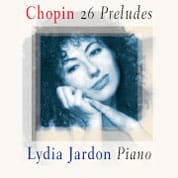Details
1. 24 Preludes op. 28
2. Prelude opus 45 in C sharp minor
3. Prelude without opus in A flat major
Registered on 7 and 8 April 1998
AR RE-SE 2001-2
Chopin's Preludes (1836-1839)
"I confess that I do not quite understand the title that Chopin was pleased to give to these short pieces: Préludes. Preludes to what?', asks André Gide in his famous Notes on Chopin. The author of Préludes was certainly not the first to ask this question, as Chopin has always been a major source of inspiration for writers. But it is not certain that in this matter, rational questions should be answered in an orderly fashion. After all, a title is only a title, an indication, an orientation, a symbol even more than a literal definition. "This is not a pipe", Magritte has established this definitively.
Ores, then, are the Préludes, these twenty-four of their author's most stripped-down pieces, which Wanda Landowska could rightly describe as 'a Couperin tinged with romanticism'. Concise in outline, vehement in emotion: the Préludes open onto nothing but themselves, moments extreme in their intensity, laconic snapshots of a state of mind. Why look for any other explanation? After all, what is romanticism if not the accepted exaltation of a vital and exemplary emotion, universal as well as eternal?
It is one of the characteristics of the Preludes that they have given rise to all sorts of vaticinations; one of their most illustrious interpreters even went so far as to give them each a title. A futile exercise, of course. That Chopin completed most of them in Mallorca, during one of the frequent periods of exaltation in his love life, and that these intimate tumults affected the composer, no one will deny. But Chopin fought the very idea of figurative music hard enough for us not to detect in these pages the influence of the sinister Carthusian monastery of Valdemosa, where he stayed in the company of George Sand, who wrote apropos: "He protested with all his might against the puerility of these imitations for the ear.
Music for its own sake, a tribute to Bach's Well-Tempered Clavier, on which Chopin draws his inspiration, assertions declined as studies or nocturnes, lullabies or mazurkas, of a duration as varied as that of waking dreams, thirty seconds, four minutes. Gide may have spoken of their 'appalling depth', but Schumann noted as an expert that the composer gave of himself as never before, 'recognisable even in the pauses and silences'. And Liszt: 'Admirable in their diversity, the work and the knowledge contained in them can only be appreciated by a scrupulous examination. Everything seems to be a first draft, an impulse, a sudden arrival.
The Preludes under a water sign? Chopin is said to have dreamt that the raindrops would gradually cover him. Hence perhaps this diluvian fluidity, this suspended resonance. Yet the freedom of their composition allows them to be appropriated without gloss, without caution. They also belong to the traveller without luggage.
Olivier Barrot
The press is talking about it!
"These preludes show a very assertive personality... Each one testifies to a very meticulous work of detail, an obvious sense of curve and line and a musical conception that is both warm and lively: The unison of the 1st, the masked voice of the 14th, the fifths of the central part of the 15th, the knell of the 17th are details that do not deceive... ... Through her refined style, Lydia Jardon always maintains attention and largely avoids the most unforgivable pitfall in Chopin: indifference. »
December 98, Étienne Moreau
